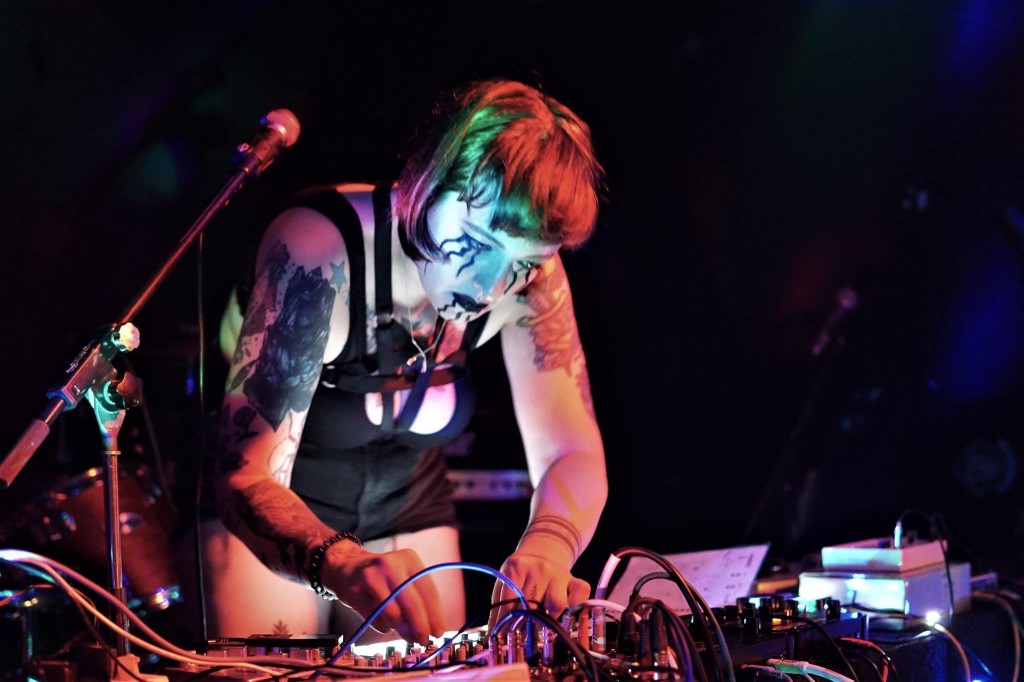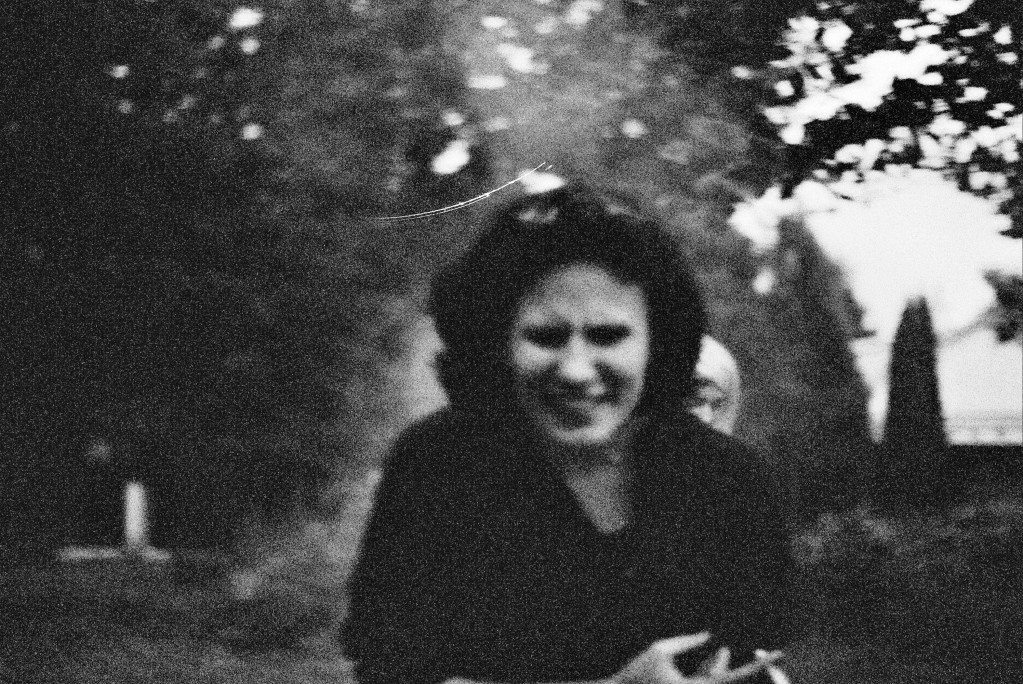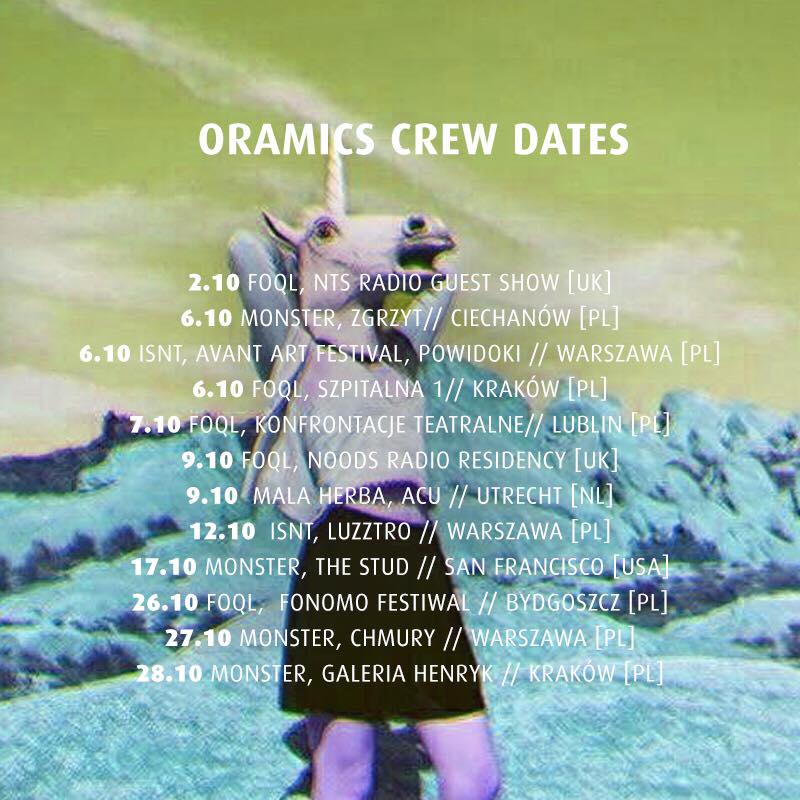Oramics, the DIY collective of women and LGBTQIA artists in Poland, is evolving into an agency, bringing Polish artists to a European scene dominated by big-name acts from London and Berlin. Here are the artists to tell us why they’re doing it – and how they’re making it work.
Oramics is named for BBC Radiophonic Workshop pioneer Daphne Oram and her techniques (unique visual synthesis methods) and her practice at large. (There’s a good Guardian story on both Oram and Delia Derbyshire, and I suspect also relevant to artists trying to make their life move forward, both women battled depression.)
Poland’s Oramics has already established itself as a prolific and talented crew of music makers, DJs, and curators. But for all the complaints you might hear that gender or feminism are becoming “commodities” in the electronic music scene, the number of collectives that have made a move to bookings – you know, the stuff you might actually get paid for – are fairly few. NYC-based Discwoman has rocketed into that territory in their four years of existence, not only acting as booking agency to their artists but working as an event platform and even offering up their own merch – check their shop. And in Berlin, Room 4 Resistance has seen some high profile collaborations and artists booked on a major agency (Futura Artists). But those are rarities more than the norm, at least in what I’ve been able to research.
And that’s still New York and Berlin. In Poland, club kids have far less money to spend (especially accounting for translating PLN currency to EUR), and acts tend not to become international stars quite as easily. Plus, with far-right political pressure cranking up in Poland and across Europe, being open about gender and sexual identity is making a significant statement.
So I spoke to Oramics’ artist-founders – they all wanted to speak equally, in fact – to tell us how they’re working to make their project work and grow.
For a listening soundtrack, let’s start with FOQL’s guest mix for NTS radio, packed with new Polish music:
https://soundcloud.com/foql/alien-jams-with-foql-nts-radio-4102018
Want to share a little bit about your artist roster? Who are they; how did you find one another?
Mala Herba: I perform solo as Mala Herba. It’s dark, minimal witchy wave, synth witchcraft as I call it. I joined Oramics after I out up a show for FOQL (Justyna). I knew Oramics through networking because I was also organizing electronic music workshops with a feminist approach.
Monster: I have been DJing for a long time and I’m from a similar background as Zosia [Mala Herba], I’ve been part of the DIY scene for ages, not really of the clubbing scene, until last year when I started DJing much more with my local Poznan crew (LOW Kollektiv). Many years ago I also ran DJing workshops at some feminist events. I actually first reached out to Oramics when I was looking for some female DJs for a party in Poznan I was co-organizing. They invited me to record a podcast for them and shortly after I was asked to join them. I play a lot of acid and Chicago house, electro, and old-school techno.
ISNT: I’ve been DJing and promoting events in Warsaw since 2005, first in Behind the Stage collective. I’ve always been looking for women and I’ve been trying to invite them to my parties. I created a series of events called BTS Female, but it later turned out that it actually needs independent space and together with VTSS (who later left our crew) we created Oramics. We drew a lot of attention and we met some girls who shared our vision and that’s how I met FOQL, with whom I quickly found common ground and we wanted to work together. Six months ago I moved to France and FOQL was left all by herself with the work and having already appreciated the work of Mala Herba, Monster and dogheadsruigeri we asked them to join us. Each one of us is different musically, we have varying experiences and that is a huge advantage, because we can share the work and each one of has can contribute in her own way. Our small dream team 🙂

dogheadsurigeri.
dogheadsurigeri mix for Oramics:
What sorts of workshops are you running? Was this significant to attendees, to be able to have a dedicated space to learn – either for a sense of community, or because they had encountered discrimination elsewhere?
Monster: We’ve been running music production, DJing and audiovisual workshops in different cities in Poland, and we’ve definitely noticed that the format of our workshops and the way we presented them was very important to the attendees. We made it very clear that we want to create a safe space, where no discrimination is allowed, and we also paid a lot of attention to picking the right people to run the workshops. We’ve all been to classes of music production where the instructor wasn’t really interested in any kind of interaction but it was rather a lecture. We want the attendees to be as involved as possible, and picking thoughtful and empathetic teachers is key.
FOQL: It is also very important to connect people from different crews together. For me, alienation is the disease of the 21st century and I am always very happy when our events get people together. Sometimes people suddenly start to collaborate and new music is made and new ideas are born. All workshops are based on donations which is also an inclusive aspect (free price).
What does it mean to shift from just being an active collective to also working as an agency? What will this entail as far as your work?
Mala Herba: We share our networks and we support each other. I like being a part of an agency that is a collective and where we can exchange, collaborate and help each other out.
Monster: At the moment, there are five of us working as the Oramics crew, but we are willing to promote and represent more people. We have already been asked to curate stages at different events and we’ve been booking artists outside our collective. It’s crucial for us to bring a lot of diversity to the electronic music scene and to promote new talent.
FOQL: I think we would also like to take more action in cities outside of Warsaw, where a lot of stuff is already happening. It is easy to forget here that Poland can be much different from what we are used to see in this capital city. We are looking for ways to work with people in smaller cities.

ISNT.
https://soundcloud.com/upperberry/uv329
Is it important to you to build some infrastructure for artists in Poland? I notice for a lot of my friends/colleagues, this is beginning to happen in countries around eastern and central Europe whereas a few years ago people might just have left for Berlin – that people are working to create more platforms at home. Do you get that sense, too?
Mala Herba: Yes! And what I like about it is that people are organizing in a new way, that’s much more engaged and critical. I mean, there’s always been collectives and squats but I have a feeling that do-it-yourself and do-it-on-your-own rules approaches are radiating to other scenes. There’s more collectively-run venues, interesting tape labels and more and more festivals that are interested in experimental music.
Monster: More than five years ago we hardly ever saw foreign artists booked at Polish clubs (mostly because we couldn’t afford it); that’s why a lot of people were moving to Western European cities to participate in the scenes that have been developing for much longer. Right now, electronic music has become much more popular and also the economic dynamics in Poland have changed. We’re seeing more and more collectives popping up, and these groups have great ideas that are more than just about partying.
ISNT: Local activities are extremely important in every region. There is a massive flow of people moving to bigger cities, where the scene functions much better, and very often those people don’t realize that their hometowns also need the scene to grow. Of course, it is more difficult, but it’s worth trying. The best examples are Up To Date festival in Bialystok or Dym Festiwal in Gorzow Wielkopolski. Poland definitely lacks booking agencies and actions directed toward local artists.
FOQL: I would say there are no agencies representing local underground electronic talents; that’s why we decided to take matters in our own hands. Artists also often do not believe in themselves, they think they should copy Berlin, London, or New York scenes … so it’s very important to give them opportunities and together create our own artistic language. We have our own experience which is very much different in post-Soviet countries than anywhere else. I personally believe it is important to build culture here and now, especially in these crazy times we have.

Mala Herba.
I know it’s a tough time politically in Poland. Are there promoters and organizers inside Poland who share an interest with raising visibility of women and LGBTQIA artists – do you have allies at home as well as abroad? Are some of them looking to book those artists / include those communities?
Mala Herba: Yes, it is difficult to observe what’s happening, but I am happy to see so many inspiring, creative initiatives that have this approach — change is here and now, instead of giving up and waiting for something to come around. A city gallery in my hometown (Galeria Dobro in Olsztyn) finally has a challenging, interesting program, there’s people putting up queer art festivals (Pomada) and parties (Ciezki Brokat) and we finally talk about unapologetic abortion rights without excuses! It really makes me hopeful. I personally live abroad but that’s more connected to my academic path; I am trying to be connected to what’s up in Poland through being involved in Oramics.
Monster: There is definitely a conversation about equality on the scene and people have different interpretations of it, but more and more promoters pay attention to diversified lineups. It’s far from perfect but I feel it’s not a strange idea anymore, there seems to be a lot of understanding of the necessity to make the scene more inclusive.
ISNT: Poland has always been going through politically challenging times, but over the last two years the tension has been growing even more. When it comes to the last decade on the electronic music scene, a lot has changed. Not everyone wants to draw a connection between music and politics, and politics have a huge influence on the culture of our country. Many people don’t want to see it, and they only want to go to a party and have fun and get away from their everyday problems. But if you look closer, those parties are often filled with sexist, homophobic, or even racist comments or attitudes. Jacek Plewicki (RRRKRTA) has been drawing attention to these issues since 2012 when he started running his events and label called Brutaz. This group supports the LGBTQIA community, women, acts against racism, and they also support our actions.
FOQL: Polish politics are getting really nasty and conservative. Anyone who says culture – including the music scene – shouldn’t comment or influence the reality for me is just blind. I always repeat – the harder political situation is, the louder we have to be as artists.

FOQL. Photo: Sonia Grzelak.
Were you aware of other collectives that had inspired you? Do you know of others that had become agencies?
Mala Herba: I was a part of a booking collective before that focused on organizing tours for queer bands around Europe and releasing records, but my experience is linked to the DIY punk scene. I am quite used to hitting up friends of friends for gigs and taking care of MH bookings myself. So I am looking forward to pushing it to the next level and learning how to be more professional and organized. Apart from gigs, bookings, we are constantly working on workshop program or curating scenes when invited. That’s very exciting.
ISNT: Creating the agency, in our case, grew from the need of being independent and to act on our own rules, I wasn’t really looking at other collectives, what we did was more of a result of our own experiences, we are all our own managers, so we decided to join forces to work on our common vision.
FOQL: I think it was a natural step for us, and also there was no more time to waste as we were all tired of managing our bookings by ourselves. It is much easier to share your experience and sometimes even speak out about your struggles on tour. It is simply empowering, like setting up new standards in a way. We just feel we are not alone in this business and we can sometimes say “no” to things we believe are really not fair and wrong. We are not based in Berlin or London where agencies who might be interested in our work exist. I mean, how long could we wait for this situation to change? Western agencies are not really interested in what is happening on our scene; you do not see many artists from our scene on festivals or clubs. Of course it changes with every month for better, but there is hard work behind it and that’s what we want to do. We just made clear statement: “We want our own, on our own rules and yes – we deserve it.”
Any interesting events coming up?
Mala Herba: We are working on a pop-up queer sound laboratory and collective first-timers jams. I will also play a hybrid set with Mchy i Porosty (mosses and lichens) and my stage name means a wild herb, so that should be very special. Monster: Actually this week we’re launching the Poznan edition of Oramics Sound Lab, we’re going to have vinyl and CDJ workshops as well as Ableton and drum machine classes.
ISNT: This Saturday I will play at Avant Art Festival in Warsaw.
FOQL: In fact we are all touring a lot which is great! It just means our efforts behind Oramics really work!
More listening
Here’s Monster’s mix for naive, featured as one of the best mixes of September on Pitchfork:
Plus Mala Herba, with her witchy wonderful live set:
And a chance to see the Oramics artists in your town, if you’re in Europe (international festivals, take note for other continents):

Previously:
Live techno after Polish punk and communism: Dyktando of Brutaż